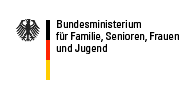Center History/ies
The GenderCompetenceCenter, just like all institutions of its kind, does not have just one history, but can trace its development back through several different histories, without which it would not exist.
One story behind the foundation of the GenderCompetenceCenter is the Coalition Agreement of 16 October 2002 between the SPD and the Bündnis 90/Greens. In Chapter VII, “Equal Treatment of Women and Men” there is a section that reads, “Gender Mainstreaming should be established in a sustained way as a method for implementing Article 3 of the Basic Law in all Federal Government Ministries and departments. (...) We will set up a gender competence centre which will support the introduction of Gender Mainstreaming into all policy fields, initiate research, bundle knowledge and train experts.”
Another story behind the foundation of the GenderCompetenceCenter is the work since February 2001 of the academic advisers to the Inter-Ministry Working Group (IMA), the Federal Government committee guiding the implementation of Gender Mainstreaming. These included Prof. Baer, B. Kreß, M. Kuhl, Dr. Sellach and Dr. Enders-Dragässer, led by the Society for Women’s Research in the Social Sciences (GSF e.V.).
Another story is the implementation of Section 2 of the Joint Rules of Procedure for the Federal Government (GGO), i.e. the principle of Gender Mainstreaming, in the German government. Under the aegis of the Ministry of Families, Senior Citizens, Youth and Women (BMFSFJ), Gender Mainstreaming tools have been developed in the form of aids, some of them even binding, for the federal ministries. One example is the Working Aid on Gender Mainstreaming for the Preparation of Legislation [German file] with regard to impact assessments.
Then there is the history of the GenderCompetenceCenter within the Humboldt-Universität itself. In early 2003, the Center for Inter-disciplinary Women’s Studies (ZiF) became the Center for Transdisciplinary Gender Studies (ZtG). This is the place where the GenderCompetenceCenter has its home as an independent research and consultancy institution in the Humboldt-Universität in Berlin. It is an externally-funded project attached to the chair of Prof. Baer in the Faculty of Law, financed by the Ministry of Families, Senior Citizens, Youth and Women (BMFSFJ).
The Humboldt University is a good base for the GenderCompetenceCenter for several reasons.
- The Humboldt University has a fully-fledged Magister course in Gender Studies which is more than just a network or an extension course. This means that cooperation among faculties, training of junior academics, transfer of gender knowledge by means of practical experience in government ministries and competence in continued and further training are practised as matter of course.
- The Gender Studies programme is unique in Germany, in that several higher education institutions and 20 disciplines work together within it. All the main subject areas and fields of action are represented, including in particular the legal system, employment market, industry, health, media, research, education, socialisation, schools, lifelong learning, adult education, infrastructure, international cooperation and globalisation. law, organisation and staff issues.
- Many young academics at the Humboldt University are working in new fields of Gender Studies (e.g. medicine, computer linguistics, administrative law, men’s studies) which can secure long term gender competence.
- The founding of the Centre for Transdisciplinary Gender Studies (ZtG) means that the Humboldt-Universität has an institute that incorporates the many years of work done by the Centre for Interdisciplinary Women’s Studies (ZiF). The ZiF was founded here in 1989 and initiated and supported Gender Studies and organised events and publications to make them accessible to a wider public.
- The Humboldt-Universität has extensive collections of data, materials and tools relating to Gender Studies
- The Humboldt-Universität is part of a dense network of cooperative ventures in Berlin (Freie Universität, University of the Arts, Technische Universität, various Universities of Applied Sciences and non-university institutions), Germany (i.a. Brandenburg and Thuringia), Europe and the rest of the world (e.g. the Gender and Health project at the Charité).
- The Humboldt-Universität has the advantage of being located in Berlin, where it is able to provide ad hoc advice and training at reasonable cost for Federal Ministries and politicians. The GenderCompetenceCenter sees itself above all as a point of contact for knowledge and information between those involved in application, research and consultancy. It does not compete with consultancy services on the free market.
- The President of the Humboldt-Universität is actively committed to research and teaching in Gender Studies and the promotion of women academics.





